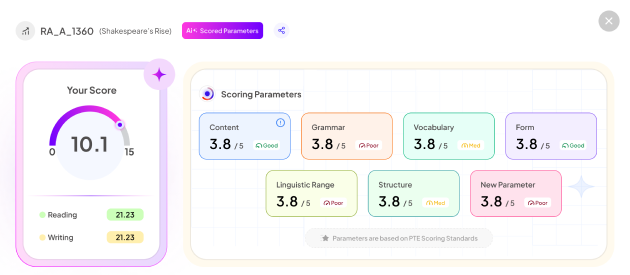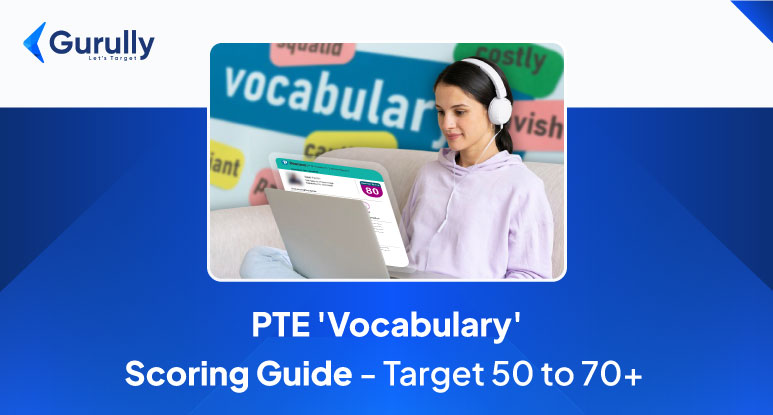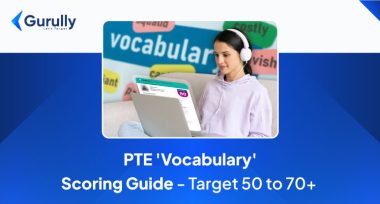In the PTE exam, vocabulary plays an important role in evaluating your English proficiency. Along with that, in many tasks, your responses are judged based on the “vocabulary” skill. Often, test-takers focus mainly on grammar and overlook vocabulary, which reduces the chances of achieving the target score. So, to avoid this, here is a detailed guide for the ‘Vocabulary’ skill that will make your preparation more streamlined.
To perform well, especially where your response is scored on vocabulary skill too, you need to show precision, variation, and contextually appropriate word usage. This blog breaks down the role of vocabulary in the PTE, the connection between score bands and vocabulary ability, and offers a step-by-step strategy for targeted improvement.
The Role of Vocabulary in PTE Tasks
In the PTE exam, vocabulary skill is evaluated in the following tasks:
- Speaking (Answer Short Question): In this task, scoring depends on whether the word you choose is accurate or not. The answer is of one word, still it needs to be contextually correct to get a score.
- Writing (Summarize Written Text, Email, and Essay): In these tasks, scoring is based on your ability to use a wide range of academic vocabulary that makes your response good. If you are committing errors or creating confusion, you might lose scores.
- Listening (Summarize Spoken text): In this, you have to understand synonyms, paraphrases, and academic language.
Start your free PTE mock test with Gurully and get AI-powered analysis for a personalized journey.


- Kickstart your PTE prep with a free AI-scored mock test
- Boost your score with in-depth analysis & smart recommendations
Score-Based Vocabulary Strategy
Different score bands reflect different levels of vocabulary control. Understanding what each score band requires helps you prepare smarter. Let’s break it down:
Below 50 – Limited and Basic Vocabulary
Common traits:
- Reliance on everyday, general English words.
- Frequently using incorrect and irrelevant vocabulary.
- Limited awareness of word collocations or formal language.
How to improve:
- Learn the Academic Word Guide. Check here.
- Try to learn topic-based vocabulary related to education, environment, health, etc.
- While doing practice, use synonyms also related to the context of the question asked.
- Practice on Gurully’s free question-wise practice.
Bonus Tip: When summarizing or writing, try to replace basic words with stronger alternatives. Like “good” or “bad” with “beneficial” or “detrimental.”
Score Range 50–59
Common traits:
- Not using topic-specific vocabulary.
- Occasional lexical errors that don’t always affect clarity.
- Repeating the same words and phrases in the response.
How to Improve:
- Expand synonym usage with paraphrasing exercises.
- Learn academic phrases and collocation words.
- Check where you are using the same word for different contexts and replace them with good alternatives.
- Write short essays and get feedback on word choice.
Bonus tip: Practice sentence transformation exercises. For example, say or write the same sentence in 2-3 different ways using different vocabulary or synonyms.
Score Range 60–69
Common traits:
- Good understanding of vocabulary related to general academic topics.
- Using many words when specific words are missing.
- Occasional misuse of idioms or expressions.
How to Improve:
- Try to learn common word combinations and phrases whose words are not literal. It will help you sound impressive and more natural.
- Try to summarize longer texts in fewer words with good synonyms without losing meaning.
- Say exactly what you mean, avoiding using random words to fill the space.
- Start using words that convey specific meanings (e.g., “significant” vs. “notable”).
Bonus tip: To enhance vocabulary, read articles or blogs from good sources like The Economist or The Guardian. Side by side, take note of how vocabulary is used to express complex ideas clearly and concisely.
Score Band 70+
Common traits:
- Strong command on formal and academic vocabulary.
- Correct usage of collocations.
- Ability to express complex ideas with precision and good vocabulary.
How to stay consistent:
- Try to understand tone in depth; e.g., formal vs. informal usage.
- Do not use words out of context; instead, use concise, impactful language.
- Always try to refine vocabulary usage through expert reviews and feedback.
- Continue reading high-level academic and opinion texts to keep refining vocabulary.
Bonus tip: Replace general expressions with subtle shifts so that the tone sounds more natural. Like “a lot of problems” with “a multitude of issues” or “a series of challenges.”
| Current Score Range | Key Problems | Action Steps | Target Vocabulary Type |
| Below 50 | Basic vocabulary, incorrect usage | Learn 500 academic words, use vocabulary apps, focus on high-frequency PTE topics | General academic, high-frequency |
| 50–59 | Repetition, some misused words | Practice paraphrasing, replace overused terms, write short summaries | Topic-specific, synonyms, paraphrasing |
| 60–69 | Occasional imprecision, limited idiom use | Study collocations, idiomatic expressions, refine tone and register | Idioms, collocations, nuanced vocabulary |
| 70+ | Minimal issues, looking for polish | Eliminate redundancy, fine-tune vocabulary for precision | Academic precision, formal tone, concise language |
Improving your vocabulary score in the PTE isn’t something that happens with just one or two mock tests — it requires consistent and focused practice. At Gurully, you can build your skills through full-length mock tests and section-wise practice tailored to your needs.
With a Prime membership, you’ll also receive a monthly predictive file and a dedicated vocabulary guide to support your preparation. All our mock tests are designed by PTE experts and include predictive questions to give you the most exam-like experience possible.
Conclusion:
Strong vocabulary is key to scoring well in the PTE exam. It helps you sound clear, precise, and confident across all tasks. But improvement doesn’t happen overnight — it takes regular practice and the right tools. Gurully’s targeted practice and expert-designed PTE mock tests can help you build and refine your vocabulary step by step. Stay consistent, and your scores will follow.
FAQ
How to improve vocabulary for PTE?
Is it easy to get 79 each in PTE?
Which is the toughest section in PTE?
What is Band 9 in PTE?
How long is PTE valid for?
Also Read:
- PTE Core Score Chart: Know How To Set Your Target Score
- Know Everything About PTE Rescore Success Rate
- PTE Table Chart: Tips, Template & Sample Questions





